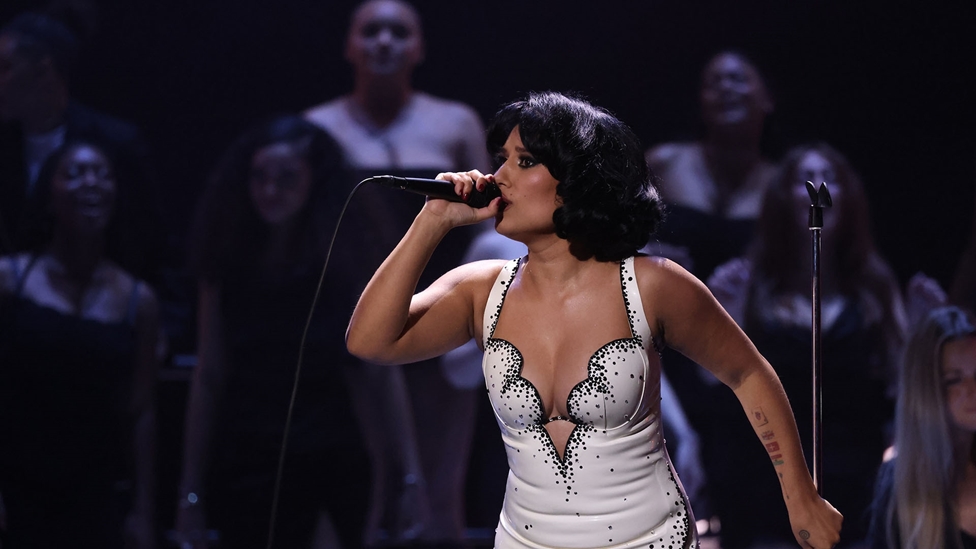From the very off, the 2024 BRIT Awards was always going to rely on women to do its heavy lifting. Moving away from significant scrutiny of last year’s bloke-heavy shortlists, the red carpet (won in, our opinion, by Charli XCX for sheer glamour, and CMAT for spectacularly-knowing ‘best dressed/worst dressed’ tabloid bait), featured St Vincent handing over the Rising Star award to The Last Dinner Party, whilst the performance roster was hugely dominated by female artists, rising to the occasion.
Dua Lipa’s performance, strong on vocal and sleek in PVC acrobatics, set the bar high, directly facing down the ‘go on girl give us nothing’ vibes that have often plagued her live performances. Ellie Goulding and Becky Hill stamped big vocals on two of the year’s biggest dance songs, whilst Tate McRae made up for less-than-stellar vocals with a dash of quintessential noughties pop stardom, complete with dance break and dubiously-assembled outfit.
In the awards themselves the representational hits kept coming, with three-quarters of wins featuring women and non-binary people. Boygenius took home International Group, Miley Cyrus got International Song Of The Year and SZA secured International Artist of the Year, giving Taylor Swift a rare night off. And then Kylie Minogue closed the whole thing out by winning Global Icon, performing a massive plinth that seamlessly matched the sheeny red acetate of her ‘Can’t Get You Out Of My Head’ era to the heart rate of ‘Padam Padam’, making time to include her oft-underrated banger ‘Love At First Sight’ (a Forty-Five fave). In a night that was dogged by criticisms of low atmosphere and awkward presenter banter, it was a solid closer, and a reminder of what can happen when female artists are genuinely cherished enough to maintain lifelong careers.
Of course, though, there can be no describing this year’s event without paying tribute to woman of the night. At 26 years old, London singer-songwriter RAYE has made BRIT Awards history for the most wins in one year. Of her seven record-breaking nominations — Song of the Year, R&B Act, Best New Artist, Songwriter, Pop Act, Artist of The Year and Album Of The Year — the only one she didn’t scoop was Best Pop Act, nabbed by Dua Lipa). All in all, the BRITs were the final cherry on top of her well-established David Vs Goliath journey, breaking out from her disappointing major label deal to become a fully realised independent star on her own. As she put it very well herself in one giddy speech, “I’m My Own Boss Now!”
As befitting somebody of her bold, relatable and often painfully honest lyricism, it seems fitting that RAYE was able to use her six acceptance speeches — and the night’s most memorable performance — to make powerful points about a lack of respect for artists. Collecting Songwriter of the Year, she spoke to industry erasure of songwriters, both in terms of verbal acknowledgement and financial recompense. “Please, whilst I’m here, British record music industry, I just wanna have a brief conversation about normalising giving songwriters master royalty points,” she said. “It can be net costs, it doesn’t have to be at your expense, but it means if songs win big the writers win big too. Please allow that to happen.”
Later in the night, she chose to perform ‘Ice Cream Man’, a song about her experiences of sexual abuse at the hands of a record producer. Played simply on piano, it was a brave and confrontational use of the platform, calling out the endemic issue of misogyny and abuse within the industry before cooly segueing into a pin-drop performance of her biggest hits.
Likely knowing that those who have hurt, dismissed or underestimated her would almost certainly be sat either at home or in the very same room, she forced them to watch her thrive, a moment truly bittersweet. By the time Album Of The Year was awarded, the triumph was complete; joined by her Grandma, she dissolved into the kind of self-confessed “ugly crying” that becomes quite infectious. “I’m so proud of this album, I’m in love with music, all I ever wanted to be was an artist and now I’m an artist with an album of the year! Thank you so much to the BRITs, this is too much, this is too much, really it is. Come on Grandma, let’s go!”
By blockading so much of her competition, RAYE’s six-time triumph could feel a little overblown, maybe even stunt-like. But being pretty much the only winner all evening to say anything even vaguely of ambassadorial substance, her success and the issues she called out only serve to highlight exactly how much the BRITs is well overdue a more significant shakeup. While bids to extend categories, remove gender boundaries and incorporate new genre categories all feel like steps in the right direction, it still feels obvious that the BRITs is a bit of a foregone conclusion, where winners are tagged near-seamlessly to performances, banter is stilted, and the overall feeling is less a celebration of the breadth and variety of British music as it is a playground for the major labels to pat themselves on the back. In a year where Jungle can triumph over Young Fathers, or Little Simz goes home empty-handed, something feels a little off in the ecosystem, rewarding safeness rather than true creative innovation.
RAYE did a great job to highlight the way that she was told “a lie that R&B doesn’t sell in the UK”, but her words only serve to illuminate how thoroughly grime, rap and R&B weren’t given much of a look-in (aside from a surprise win by enigmatic London rapper Casisdead). Meanwhile, this year’s presenters tried their best to engage artists via drinking-gag laden autocue – (did they really make Kylie drink out her own shoe?) – with only consummate professional Clara Amfo really feeling like she was in the moment. No shade should be intended towards Maya Jama or Roman Kemp per se, but in the context of the UK’s music biggest televisual night, Amfo’s kinship and long-term professional support for Raye translated clearly through the television, a testament to the value of specialist, thoughtfully-trained music journalism in our wider industry ecosystem.
As a BRIT school alumni herself, RAYE is not immune from certain privileges. But in lieu of passionate speeches, risky politics or many genuinely underdog wins, it’s good to see someone who is willing to swing big with their music and isn’t afraid to challenge the complacency in the industry that seems to assume that Great Britain will always be able to rest on its laurels as a historically-brilliant exporter of music. It’s a delight to see Raye triumph, but when the most interesting and powerful winner of the night is somebody who had to escape everything that the BRITs stands for in order to be welcomed back, what does it really say about where UK music is at? Her wins may be her crowning glory, but they should also serve as a wake-up call — until we do more to challenge the misogyny, mismanagement and major-label monopoly that plagues the arts, a success story like RAYE will always be the plucky self-motivated exception rather than the rule.







